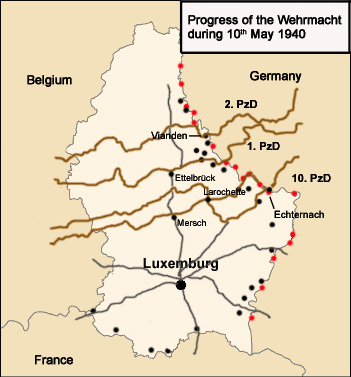|
Maurice Stein (gendarme)
Maurice Stein (October 1, 1884, Berg - March 7, 1957) was a Luxembourgish Captain (honorary major) who headed the Gendarme and the Volunteer Corps. He was married to Georgette Schulze. Biography Stein began in the lower ranks of the Volunteer Corps of Luxembourg, which he entered on the 7 of August, 1905, before being promoted to Lieutenant on October 18, 1909. On the 31 of January, 1915, Maurice was attached to the Gendarme, and placed issued the position of military district commander for Diekirch. Stein oversaw the Gendarmes at the time of the German invasion of Luxembourg in 1940. Prior to the outbreak of hostilities, a series of nine radio outposts were established along the German border, each manned by gendarmes, with a central radio receiver In radio communications, a radio receiver, also known as a receiver, a wireless, or simply a radio, is an electronic device that receives radio waves and converts the information carried by them to a usable form. It is used with ... [...More Info...] [...Related Items...] OR: [Wikipedia] [Google] [Baidu] |
Diekirch
Diekirch ( lb, Dikrech or (locally) ; from ''Diet-Kirch'', i.e. "people's church") is a commune with town status in north-eastern Luxembourg, capital city of the canton Diekirch and, until its abolition in 2015, the district of Diekirch. The town is situated on the banks of the Sauer river. The town's heraldic shield, showing a crowned lion on a castle, was granted in 1988. It is based on the town's 14th-century seal and arms. In 2001, the town of Diekirch itself, which lies in the south of the commune, had a population of 6,068. in 1977, Diekirch was the first town in Luxembourg to have a pedestrian zone. Diekirch is home to a brewery of national importance carrying the town's name. Three secondary schools are located in Diekirch: ''Lycée classique de Diekirch'', ''Lycée technique hôtelier Alexis Heck'' and ''Nordstadlycée''. The town is home to the national operational headquarters of the Luxembourgish Army at the Haerebierg Military Centre (located on the hill Herre ... [...More Info...] [...Related Items...] OR: [Wikipedia] [Google] [Baidu] |
German Invasion Of Luxembourg
The German invasion of Luxembourg was part of Case Yellow (german: Fall Gelb), the German invasion of the Low Countries—Belgium, Luxembourg and the Netherlands—and France during World War II. The battle began on 10 May 1940 and lasted just one day. Facing only light resistance, German troops quickly occupied Luxembourg. The Luxembourgish government, and Grand Duchess Charlotte, managed to escape the country and a government-in-exile was created in London. Background On 1 September 1939 Germany invaded Poland, initiating World War II. This put Luxembourg's Grand Ducal government in a delicate situation. On the one hand, the population's sympathies laid with the UK and France; on the other hand, due to the country's policy of neutrality since the Treaty of London in 1867, the government adopted a careful non-belligerent stance towards its neighbours. In accordance with the treaty's restrictions, the only military force Luxembourg maintained was its small Volunteer Corps un ... [...More Info...] [...Related Items...] OR: [Wikipedia] [Google] [Baidu] |
University Of Luxembourg
The University of Luxembourg ( French: ''Université du Luxembourg''; German: ''Universität Luxemburg''; Luxembourgish: ''Universitéit Lëtzebuerg'') is a public research university in Luxembourg. History The University of Luxembourg was founded in 2003 by combining four existing education and research institutes: the Centre universitaire, Institut supérieur d'études et de recherches pédagogiques, Institut supérieur de technologie, and Institut d'études éducatives et sociales. The university is the only public university in Luxembourg. Description The university has three campuses: the Belval Campus, the Kirchberg Campus, and the Limpertsberg Campus. The university is governed by a board of governors, a rector, and a university council. The current rector of the University of Luxembourg is Stéphane Pallage. Academics The university offers fourteen bachelor's degrees, forty-two master's degrees, and doctorates. Bachelor's degrees require a semester abroad. The u ... [...More Info...] [...Related Items...] OR: [Wikipedia] [Google] [Baidu] |
Radio Receiver
In radio communications, a radio receiver, also known as a receiver, a wireless, or simply a radio, is an electronic device that receives radio waves and converts the information carried by them to a usable form. It is used with an antenna. The antenna intercepts radio waves (electromagnetic waves of radio frequency) and converts them to tiny alternating currents which are applied to the receiver, and the receiver extracts the desired information. The receiver uses electronic filters to separate the desired radio frequency signal from all the other signals picked up by the antenna, an electronic amplifier to increase the power of the signal for further processing, and finally recovers the desired information through demodulation. Radio receivers are essential components of all systems that use radio. The information produced by the receiver may be in the form of sound, video (television), or digital data. A radio receiver may be a separate piece of electronic equipment, or an ... [...More Info...] [...Related Items...] OR: [Wikipedia] [Google] [Baidu] |
Luxembourgian Soldiers
Luxembourgish ( ; also ''Luxemburgish'', ''Luxembourgian'', ''Letzebu(e)rgesch''; Luxembourgish: ) is a West Germanic language that is spoken mainly in Luxembourg. About 400,000 people speak Luxembourgish worldwide. As a standard form of the Moselle Franconian language, Luxembourgish has similarities with other varieties of High German and the wider group of West Germanic languages. The status of Luxembourgish as an official language in Luxembourg and the existence there of a regulatory body have removed Luxembourgish, at least in part, from the domain of Standard German, its traditional . History Luxembourgish was considered a German dialect like many others until about World War II but then it underwent ausbau, that is it created its own standard form in vocabulary, grammar and spelling and therefore is seen today as an independent language, an ausbau language. Due to the fact that Luxembourgish has a maximum of some 285,000 native speakers, resources in the language like ... [...More Info...] [...Related Items...] OR: [Wikipedia] [Google] [Baidu] |



